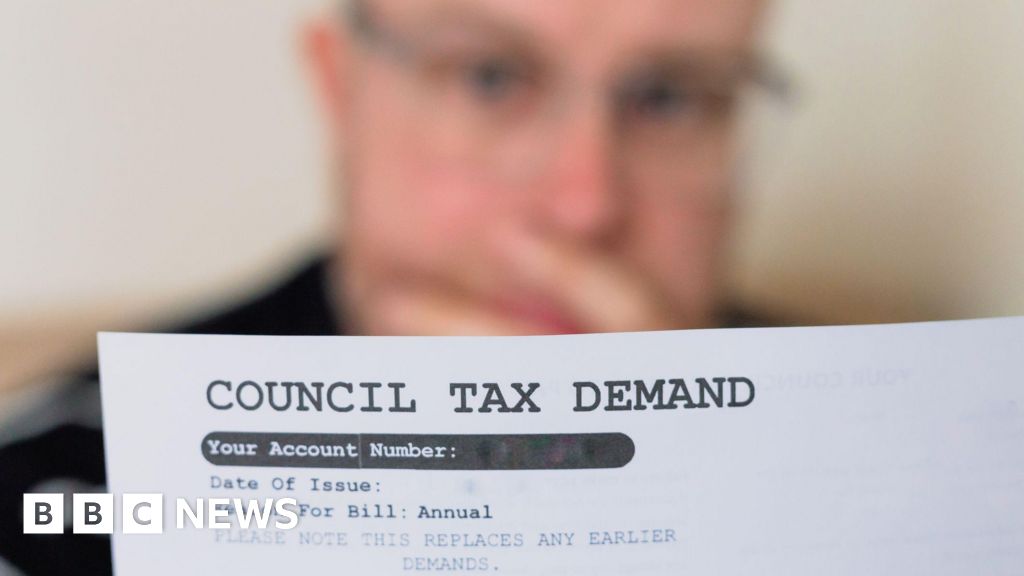Struggling households owe billions of pounds in unpaid council tax, but bills are expected to keep rising in the years ahead. Newly-published figures show £6.6bn is owed to local authorities in England, with an extra £642m having been added to those arrears in the year to April. Separate data from Scotland and Wales means the total cumulative amount owed in the three countries has hit more than £8bn. Campaigners have called for a more sympathetic approach to council tax debt collection, rather than the use of bailiffs. While the government is proposing a change in the rules over the way unpaid bills are chased, the Treasury is alsoassuming council tax will riseby 5% a year in the future. Asked whether the Treasury was "baking in" a 5% increase, Chief Secretary Darren Jones told a committee on Wednesday examining the recent Spending Review: "We are doing that, yes." Councils can raise council tax by up to this amount, although they can go above this cap if they hold a local referendum or get approval from central government. Thelatest figures for Englandshow that, in the 12 months to April, local authorities collected a total of £41.2bn in council tax, irrespective of the year to which it related. This was an increase of £2.8bn, or 7.2%, compared with the previous year. However, the amount cumulatively owed has risen by 11% over the same period. In Scotland,£1.5bn is owed, and there are arrears of£160m in Wales. Charities have long argued that the method of council tax collection in England punishes those who are genuinely struggling to pay. Non-payment of a monthly bill after three weeks, or three late payments, in England means the council can send a demand for the remainder of the year's council tax to be paid in full. They can later send in bailiffs to recover the debt. "People in council tax arrears are overwhelmingly on low incomes, and many are living in poverty," said Toby Murray, from charity Debt Justice. "Rather than help, councils are sending in the bailiffs - punishing people for struggling with their bills. Councils should end the use of bailiffs for council tax debt collection and instead introduce urgent reforms." The government recently unveiled plans to cap the fees added to debt when going to court and to loosen the rules on when a household may become liable for a full-year's bill. Ministers are already reviewing debt enforcement practices, including the conduct of bailiffs. They are also proposing making 12 monthly payments of council tax the default option, rather than 10.
Struggling homes owe billions in council tax ahead of rise
TruthLens AI Suggested Headline:
"Households in England Face Billions in Unpaid Council Tax Amid Rising Costs"
TruthLens AI Summary
Recent figures have revealed that struggling households in England owe a staggering £6.6 billion in unpaid council tax, a figure that has increased by £642 million in the past year alone. When combined with debt figures from Scotland and Wales, the total amount owed across these three countries exceeds £8 billion. This financial burden is particularly concerning as the government anticipates council tax rates will rise by 5% annually in the coming years. Chief Secretary Darren Jones confirmed that the Treasury is effectively 'baking in' this increase, allowing local authorities to raise council tax by this percentage unless they seek a local referendum or obtain central government approval for higher rates. Despite local authorities collecting £41.2 billion in council tax over the past year, the cumulative arrears have increased by 11%, indicating a growing disparity between what is owed and what is being collected.
Charities and campaigners have raised alarms over the current practices surrounding council tax debt collection, arguing that they disproportionately affect low-income households and those experiencing poverty. According to Toby Murray from the charity Debt Justice, the existing system punishes individuals for their financial struggles rather than providing them with support. In England, council tax arrears can escalate quickly; after just three weeks of non-payment or three late payments, councils can demand the full year's bill upfront and pursue debt recovery through bailiffs. This approach has been criticized as punitive, leading to calls for urgent reforms. In response, the government has proposed changes to limit the fees associated with court actions for debt collection and to modify the rules determining when a household becomes liable for the full year's council tax. Additionally, there are plans to make 12 monthly payments the default payment option, which could alleviate some of the financial pressure faced by struggling families.
TruthLens AI Analysis
You need to be a member to generate the AI analysis for this article.
Log In to Generate AnalysisNot a member yet? Register for free.
